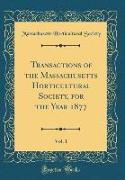- Start
- Transactions of the Massachusetts Horticultural Society, for the Year 1877, Vol. 1 (Classic Reprint)
Transactions of the Massachusetts Horticultural Society, for the Year 1877, Vol. 1 (Classic Reprint)
Angebote / Angebote:
Excerpt from Transactions of the Massachusetts Horticultural Society, for the Year 1877, Vol. 1Different varieties of squashes and pumpkins seem to come from different countries, yet, with a few exceptions of recent introduction, we know very little about their origin. Prof. Asa Gray, says The pumpkin was cultivated by the North American Indians, be fore the coming of the whites. He also says: The orange and egg gourd grows wild in Texas, and is probably the original of all this group.It seems to me that the pumpkin might have originated from the gourd, and the squash from the pumpkin. The fact that the gourd is more vigorous and productive than the pumpkin, and that the pumpkin is more vigorous than the squash, seems to indicate this order of improvement. It is a well established fact that the farther from the original an animal or plant is carried by domestication and improvement, the less vigor it has, and certainly our best squashes have less constitution and vigor than the pumpkin, and the pump kin less than the wild gourd.Selecting the Soil. The first step in order to raise a paying crop of squashes, is to select a soil suited to the crop, for without the right soil it is useless to waste time, seed, and manure. The squash requires a rich, warm soi1, - such a soil as will produce seventy five bushels of corn per acre. It should be a strong loam, without too much sand, or too heavy with clay, yet it would be better to be quite light than heavy and cold. As a general rule squashes grown on light, warm land are not so large, but are more solid, keep better, and are of better ¿avor than those grown on low or cold land. A side-hill with a southern aspect is preferable, {especially when one's land is late and cold. It is useless to attempt to grow squashes on cold or wet land, for, like corn, they are very sensitive to cold, and will not grow in the shade, or where the land is satu rated with water. Squashes may be grown either on inverted sods, or on old tillage land, but I prefer the sod land, because it is freer from weeds and bugs than old land.About the PublisherForgotten Books publishes hundreds of thousands of rare and classic books. Find more at www.forgottenbooks.comThis book is a reproduction of an important historical work. Forgotten Books uses state-of-the-art technology to digitally reconstruct the work, preserving the original format whilst repairing imperfections present in the aged copy. In rare cases, an imperfection in the original, such as a blemish or missing page, may be replicated in our edition. We do, however, repair the vast majority of imperfections successfully, any imperfections that remain are intentionally left to preserve the state of such historical works.
Folgt in ca. 10 Arbeitstagen
